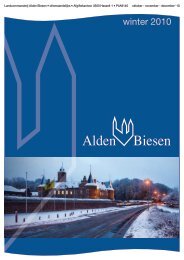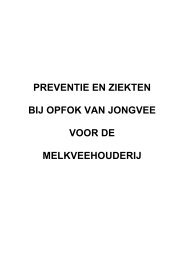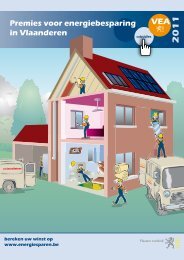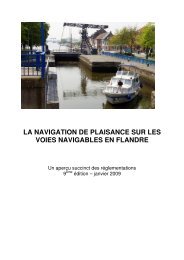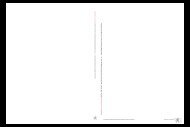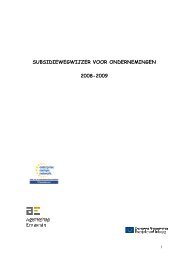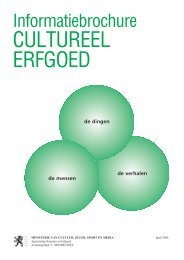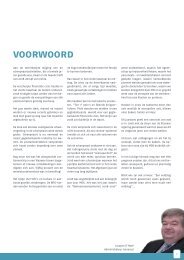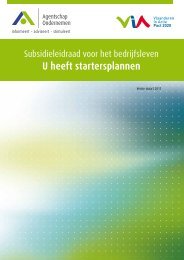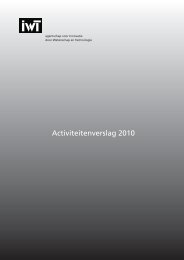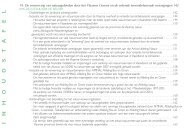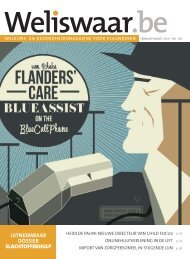Acknowledgements Book of abstracts - Publicaties - Vlaanderen.be
Acknowledgements Book of abstracts - Publicaties - Vlaanderen.be
Acknowledgements Book of abstracts - Publicaties - Vlaanderen.be
Create successful ePaper yourself
Turn your PDF publications into a flip-book with our unique Google optimized e-Paper software.
Kamara Scott presents Oral paper 27<br />
In session 5: Development and improvement <strong>of</strong> welfare assessment protocols<br />
Friday, 12 Septem<strong>be</strong>r 2008 from 12h00-12h15 in the Aula chaired by Linda Keeling<br />
55<br />
Oral paper 27<br />
EVALUATION OF A PROTOTYPE WELFARE MONITORING SYSTEM<br />
FOR SOWS AND PIGLETS (WELFARE QUALITY PROJECT®)<br />
K. Scott 1 , G. Binnendijk 2 , S.A. Edwards 1 , J.H. Guy 1 , M. Kiezebrink 2 , H. Vermeer 2<br />
1 School <strong>of</strong> Agriculture, Food and Rural Development, Newcastle University, Newcastle upon Tyne, UK<br />
2 Animal Sciences Group, Wageningen University and Research Centre, Netherlands.<br />
Purpose This research was carried out as part <strong>of</strong> the Welfare Quality® project, which aims to<br />
develop a European on-farm welfare assessment standard for pigs, as well as cattle and poultry.<br />
Using a combination <strong>of</strong> information available in the scientific literature and preliminary pilot<br />
studies, separate prototype welfare monitoring protocols were developed for sows and piglets<br />
(breeding herd), fattening pigs (finisher herd) and pigs at slaughter.<br />
Methods The prototype welfare assessment protocol was devised using a combination <strong>of</strong> animal-<br />
(e.g. skin lesions, health measures, <strong>be</strong>haviour) and resource-based measures (e.g. stocking density,<br />
environmental enrichment provision) to assess pig welfare. Pilot studies are <strong>be</strong>ing carried out on a<br />
wide variety <strong>of</strong> farming systems (e.g. outdoors, deep-straw, organic, fully-slatted, stalls) in order to<br />
assess how practical the measures are, their prevalence, and to develop a large database so that<br />
typical scores can <strong>be</strong> <strong>be</strong>nch-marked. Data from a total <strong>of</strong> 90 farms (allocated equally <strong>be</strong>tween the<br />
UK and the Netherlands) are in the process <strong>of</strong> <strong>be</strong>ing collected.<br />
Results Approximately 50 farms have <strong>be</strong>en visited so far. Preliminary data analysis indicates the<br />
prevalence <strong>of</strong> severe vulval lesions, body lesions, bursitis and extremely poor body condition for<br />
individual dry sows as 1.8, 1.0, 0.7 and 0.2% respectively, with a range <strong>of</strong> 0-13.3, 0-16.7, 0-6.7 and<br />
0-6.7% prevalence respectively for individual farms. System comparisons can only <strong>be</strong> reliably<br />
made once the full data set has <strong>be</strong>en collected. System design affects practicality <strong>of</strong> some measures;<br />
for example, on outdoor farms, it is <strong>of</strong>ten difficult to achieve close proximity to the sows due to the<br />
large paddock sizes typically found, and to carry out <strong>be</strong>haviour observations in poor weather.<br />
Conclusions The complete data set will enable a refined final on-farm welfare monitoring system<br />
for sows and piglets to <strong>be</strong> developed and <strong>be</strong>nchmarks established.<br />
Contact information: Kamara Scott or email Kamara.Scott@ncl.ac.uk<br />
Complete address: School <strong>of</strong> AFRD Agriculture Building Newcastle University Newcastle upon Tyne<br />
NE1 7RU and School <strong>of</strong> Agriculture, Food and Rural Development, Newcastle<br />
University, Newcastle upon Tyne, NE1 7RU, UK<br />
Species: Pig



